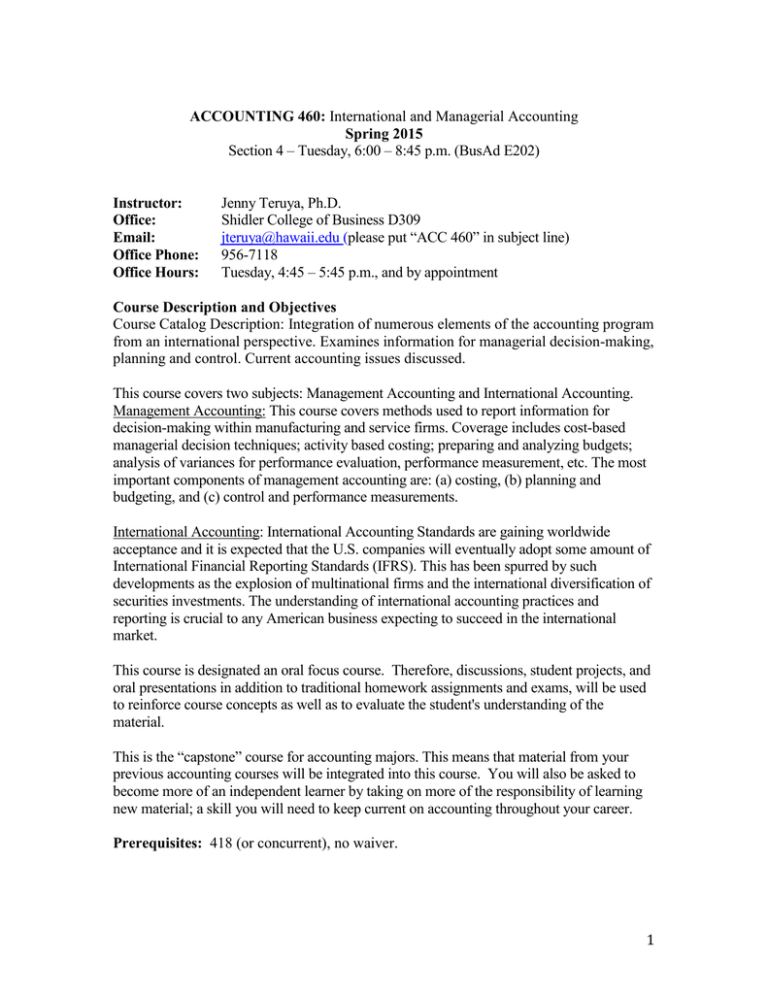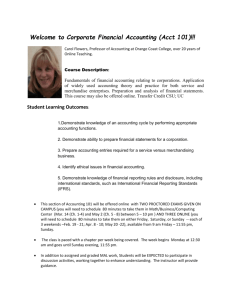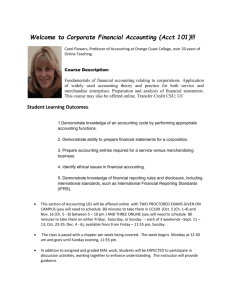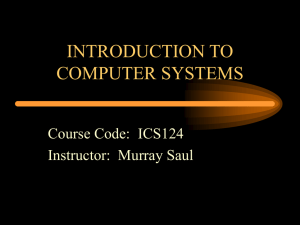
ACCOUNTING 460: International and Managerial Accounting
Spring 2015
Section 4 – Tuesday, 6:00 – 8:45 p.m. (BusAd E202)
Instructor:
Office:
Email:
Office Phone:
Office Hours:
Jenny Teruya, Ph.D.
Shidler College of Business D309
jteruya@hawaii.edu (please put “ACC 460” in subject line)
956-7118
Tuesday, 4:45 – 5:45 p.m., and by appointment
Course Description and Objectives
Course Catalog Description: Integration of numerous elements of the accounting program
from an international perspective. Examines information for managerial decision-making,
planning and control. Current accounting issues discussed.
This course covers two subjects: Management Accounting and International Accounting.
Management Accounting: This course covers methods used to report information for
decision-making within manufacturing and service firms. Coverage includes cost-based
managerial decision techniques; activity based costing; preparing and analyzing budgets;
analysis of variances for performance evaluation, performance measurement, etc. The most
important components of management accounting are: (a) costing, (b) planning and
budgeting, and (c) control and performance measurements.
International Accounting: International Accounting Standards are gaining worldwide
acceptance and it is expected that the U.S. companies will eventually adopt some amount of
International Financial Reporting Standards (IFRS). This has been spurred by such
developments as the explosion of multinational firms and the international diversification of
securities investments. The understanding of international accounting practices and
reporting is crucial to any American business expecting to succeed in the international
market.
This course is designated an oral focus course. Therefore, discussions, student projects, and
oral presentations in addition to traditional homework assignments and exams, will be used
to reinforce course concepts as well as to evaluate the student's understanding of the
material.
This is the “capstone” course for accounting majors. This means that material from your
previous accounting courses will be integrated into this course. You will also be asked to
become more of an independent learner by taking on more of the responsibility of learning
new material; a skill you will need to keep current on accounting throughout your career.
Prerequisites: 418 (or concurrent), no waiver.
1
Course Materials
1.
Atkinson, Kaplan, Matsumura, Young, Management Accounting: Information for
Decision Making and Strategic Execution, 6th Edition, Pearson/Prentice-Hall, 2012
(required either in hard copy or e-book).
2.
MyAccountingLab access (this will be used for homework submissions) Course ID:
teruya95415
3.
Laulima: various course materials will be made available on Laulima including
required readings, homework assignments, project assignments, etc.
Class Preparation
Students are expected to come to class prepared. Preparation includes reading the
chapter text, completing remedial exercises, completing homework assignments, etc.,
as indicated on the syllabus (students are responsible for obtaining information about
any changes to the syllabus from their classmates). This will ensure that you are able
to participate in class discussions. Check announcements on Laulima after 5:00 p.m.
on the day prior to classes to download and/or print materials that will be required in
class the following day. Expect to spend an average of 3 hours outside of class for
every hour spent in class.
Computers in the classroom
Use of computers in the classroom is encouraged, but should be used solely for course
work. Unauthorized use of your computer during class time will result in a 1%
deduction from your final grade for each offense. These deductions are made solely at
the discretion of the instructor.
Grades
The following grading weights will apply to the course:
Homework (MyAccountingLab and written homework)
Business plan project (various assignments and presentations)
Financial Statement project
IFRS vs. GAAP (handout and presentation)
In-class group work
Participation/evaluations/pop quizzes
Mid-term Exam
Final Exam (non-cumulative)
Total
10%
25%
10%
15%
10%
5%
10%
15%
100%
In fairness to other students, late work will not be accepted even for excused absences.
For written assignments, if you think you will be late to class, you may email the
assignment to me. You will still need to submit a hard copy of the assignment, but the
time stamp on the email will be used to determine whether the assignment was
submitted in a timely manner.
The final grades will employ plus and minuses, within the A, B, C, D, and F
framework (or I for incomplete).
2
Homework on MyAccountingLab: The majority of homework for the managerial
accounting portion of the course will be submitted via MyAccountingLab
(abbreviated as “MAL” on the tentative schedule). Each individual exercise/problem
(there are multiple exercises/problems for each chapter) will be worth 1 point. A
score of 75% or higher on each exercise will earn you the full point; no points will be
earned for scores less than 75%. You may try each exercise up to 3 times (each
attempt may provide a different set of numbers). On multi-part questions, you may
“Check Answer” once for each part.
Although the submissions are electronic, you should keep a written record of your
supporting calculations. The assignments must be submitted by noon on the due
date.
Remedial exercises. These exercises cover topics that you should have learned in
ACC 201 and 202. In most cases, we will not cover these topics in class, but you will
need to understand them as this course will expand on them. Scores on these exercises
will not be included in your course grade, however they must be satisfactorily
completed (score of 75% or higher on each individual exercise) by 6:00 p.m. on the
due date. A 1% reduction in your course grade will result for every calendar day late
(starting at 6:01 p.m. on the due date).
MyAccountingLab course ID (for remedial assignments only): teruya03605
Access Code: HSCOAE-GIGLI-FOUND-FAUNA-HIGHS-TUNES
Written homework: You will be required to complete all of the homework for the
international accounting portion of the class and some of the managerial accounting
homework in written form. These assignments should be typed, with your name and
assignment due date in the top right corner. A properly completed assignment
should show supporting calculations and be formatted appropriately. Some of these
assignments will be the basis of class discussions so will be useful in allowing you to
participate in these discussions. These will be randomly collected and graded based
on completeness as well as correctness (1 point for each problem collected).
Handwritten assignments will not be accepted.
Business plan project (group): Throughout the semester, in groups of 3 or 4, you
will be putting together a business plan that will require you to utilize the concepts we
will be learning. There will be numerous written assignments and at least one
presentation required. Additional details to follow.
Financial statement project: At the beginning of the semester, you will select a
company’s financial statements that you and one other person will analyze.
Additional details to follow.
3
IFRS vs. GAAP: In groups of 3 or 4, you will identify an area where U.S. GAAP
differs from IFRS. A written summary of the differences (which will be shared with
the rest of the class) as well as a presentation will be required. Additional details to
follow.
In-class group work: For many of the group assignments, class time will be
provided to work in your groups. The groups will be evaluated on their group
communication skills.
Participation in class discussion/preparedness and quality of evaluations/pop
quizzes: Throughout the semester, your participation in class discussions will be
monitored. In order to participate, you have to be in class and be prepared. Therefore,
while attendance is not required, absences will affect this portion of your grade
severely. You will also be asked to evaluate the oral presentations of your classmates
and the performance of group members on various assignments. The usefulness of
your evaluations to the student (for purposes of improving their oral communication
skills) and to the instructor (for evaluating the contributions of different group
members) will be assessed. Finally, pop quizzes may be given (rarely) on material
covered.
Exams: There will be two exams for this course. They may contain multiple choice,
short answer, computational problems and/or essays. Calculators will be provided for
all exams. Make-up exams will be given only under very rare circumstances. In all
cases, the instructor must be notified prior to the exam date and time. If the
instructor is not available prior to the exam, leave a message on her voice mail
(prior to the examination time). Failure to notify the instructor on a timely basis
will result in a “0” for the exam. All excuses for illness must be supported by a
doctor’s note. The final exam date is indicated on the attached assignment schedule
so please make any travel plans accordingly.
General comments on group assignments: Group submissions imply that all
members of the group have participated in the preparation of and are responsible for
and knowledgeable of the entire submission, not just the part he/she may have worked
the most on.
Unprofessional behavior: Students should be respectful of others in the class.
Behavior that is disruptive and persistent will result in a 1% deduction from your final
grade for each offense. These deductions are made solely at the discretion of the
instructor.
4
Withdrawal/Drop Policy:
The student has the responsibility to withdraw from the course by the appropriate
deadline. If a student stops attending class and does not drop the course, a grade of
"F" will be assigned at the end of the semester.
Last day to drop without a “W”:
Last day to drop with a “W”:
January 20
Please check with OSAS in B101 for
College deadline to drop classes
Disability access:
Students with disabilities are encouraged to contact the KOKUA program for
information and services. Services are confidential and students are not charged for
them. Contact KOKUA at 956-7511 (voice/text), kokua@hawaii.edu, or Student
Services Center, Room 13.
Important note:
In the case of bomb threat, please meet at the corner of Maile Way and University
Ave. I will then give you instructions regarding where the class will meet.
Academic honesty (READ VERY CAREFULLY)
Students are expected to behave with integrity in all academic endeavors. Cheating,
plagiarism, as well as any other form of academic dishonesty, will not be tolerated. All
incidents will be handled in accordance with the UH Student Code of Conduct. The UH
Student Code of Conduct, is available
at:http://www.studentaffairs.manoa.hawaii.edu/policies/conduct_code/. Please become
very familiar with the University Student Conduct Code so you can make conscience and
informed choices about your behavior. Some relevant portions of the code are included
below for your convenience.
Acts of dishonesty, types of behavior that conflict with the community standards that the
UH values and expects of students, include but are not limited to the following:
a.
cheating, plagiarism, and other forms of academic dishonesty,
b.
furnishing false information to any UH official, faculty member, or office,
c.
forgery, alteration, or misuse of any UH document, record, or form of
identification.
The term "cheating" includes, but is not limited to: (1) use of any unauthorized assistance
in taking quizzes, tests, or examinations; (2) use of sources beyond those authorized by
the instructor in writing papers, preparing reports, solving problems, or carrying out other
assignments; (3) the acquisition, without permission, of tests or other academic material
belonging to a member of the UH faculty, staff or student (4) engaging in any behavior
specifically prohibited by a faculty member in the course syllabus or class discussion.
The term "plagiarism" includes, but is not limited to, the use, by paraphrase or direct
5
quotation, of the published or unpublished work of another person without full and clear
acknowledgement. It also includes the unacknowledged use of materials prepared by
another person or agency engaged in the selling of term papers or other academic
materials.
In addition to the above, the instructor specifically prohibits the following behaviors, and
includes them within the definition of academic dishonesty: (1) providing another
student with any form of direct or indirect, unauthorized assistance on any assignment,
quiz, test or exam; and (2) copying, or recording in any manner, test or exam questions or
answers.
Please NOTE:
UH disciplinary proceedings may be instituted against a student charged with conduct
that potentially violates both the criminal law and this Student Conduct Code (that is, if
both possible violations result from the same factual situation) without regard to the
pendency of civil or criminal litigation in court or criminal arrest and prosecution.
Engaging in any of the above activities AND/OR assisting others in the engagement of the
above activities is not allowed. If you have a question about whether you may use a specific
source to complete an assignment, please ASK before using it. Students caught cheating or
plagiarizing will fail this course.
6
TENTATIVE SCHEDULE
(This is meant to be a general guide for the course and changes are highly likely.
Changes will be announced in class; students missing class should check with their
classmates for such announcements.)
Date
January 13
Due
January 20
Read Chapters 1-2
HW: Case, 1-17, E2-33
BP Individual: Identify
key objectives for
strategy
January 27
Remedial HW: Costing
due
BP Group: Balanced
Scorecards/Company
overview/Description of
processes write-up
Read Ch. 3 (p. 62-78)
Read Ch. 4 (p. 121-127,
146-150)
MAL: Cost Classifications
February 3
BP Individual: Identifying
cost items and estimated
costs
MAL: Overhead cost
allocation
BP Group: Completed
cost worksheets
MAL: Allocating Service
Department Costs
Read Ch. 5
Remedial HW:
Accounting Cycle
Select Company for
Financial Statement
Project
February
10
Coverage
Course overview
Communication skills
Lecture: Strategy
BP Groups: Discuss strategy
Lecture: Balanced Scorecard
BP Groups: Preparing Balanced
Scorecard
Financial Accounting Review: Accounting
Cycle, Financial Statements, Conceptual
Framework
Presentations: “Sell your Company”
Lecture: Cost categories and behavior
Financial Accounting Review: Assets,
Liabilities
BP Group: Cost worksheets
Lecture: Assigning costs to products
Financial Accounting Review: Equity,
Revenue Recognition, Leases
Lecture: Activity Based Costing and
Time-Driven Activity Based Costing
FS Group: Begin Financial Statement
project
7
Date
February
17
February
24
March 3
Due
MAL: Time-Driven
Activity Based Costing
Read Ch. 3 (p. 78-95)
MAL: Using Cost
Information
BP Group: CVP and
Decision-making
Assignment
MAL: Using cost
information II
Remedial HW: Budgeting
Read Ch. 10 (p. 393-416,
431-435)
3 questions to review for
exam
FS Group: Met w/Jenny
Coverage
Lecture: Using cost information
BP Group: CVP and Decision-making
Assignment
Lecture: Budgeting
Exam Review
Mid-term 1: Chapters 1-5, financial
accounting review
Brief review of mid-term
BP Group: Begin Budget assignment
Discussion: Should accounting standards
be harmonized?
March 10
MAL: Master Budget
Arguments for/against
harmonization
March 17
Read Ch. 7
MAL: Facility Layout
FS Group: Financial
Statement Projects due
Spring Break
Lecture: Process Performance; Cost of
Quality
IFRS Group: IFRS Introduction
BP Group: Budget
MAL: Quality
improvement
Read Ch. 6
MAL: Customer
profitability
Read Foreign Currency
transactions
Lecture: Measuring Customer
Relationships
Lecture: Foreign Currency Transactions
and hedging
March 24
March 31
8
Date
April 7
April 14
April 21
April 28
May 5
May 12
Due
Coverage
MAL: Customer
Lecture: Production Variances
Profitability-TDABC
Lecture: Foreign Currency Translations
HW: Foreign currency
transactions and forward
contracts
Read Ch. 10 (p. 417-428)
Read Foreign Currency
Translations
IFRS Group: Handout due
IFRS Group: Have met
IFRS Presentations
with Jenny
HW: Foreign Currency
Translation
BP Individual: Calculate
IFRS Presentations
variances
BP Group: Variance Analysis
BP Group: Variance
Lecture: Sales Variances
Analysis
Lecture: Transfer Pricing
Read Ch. 10 (p. 428-430)
MAL: Sales Variances
Lecture: Evaluating divisional
performance
Read Ch. 11
Review for Exam
MAL: Responsibility
Accounting
3 questions to review for
exam
MAL: Responsibility
Final Exam
Accounting II
9







